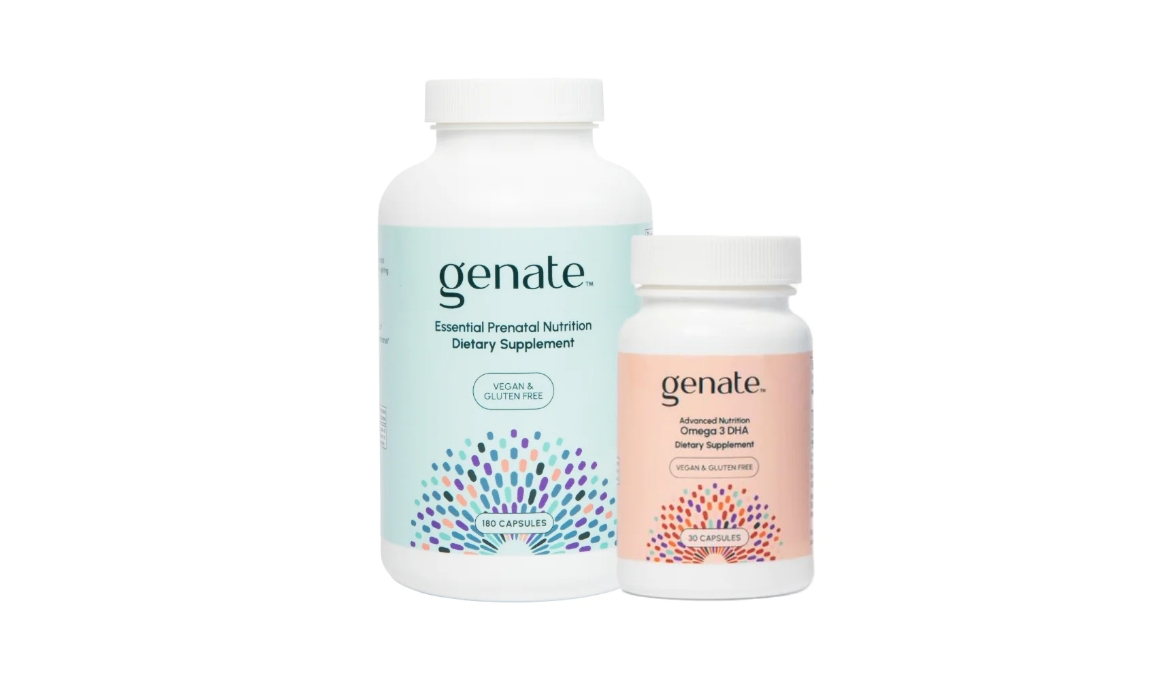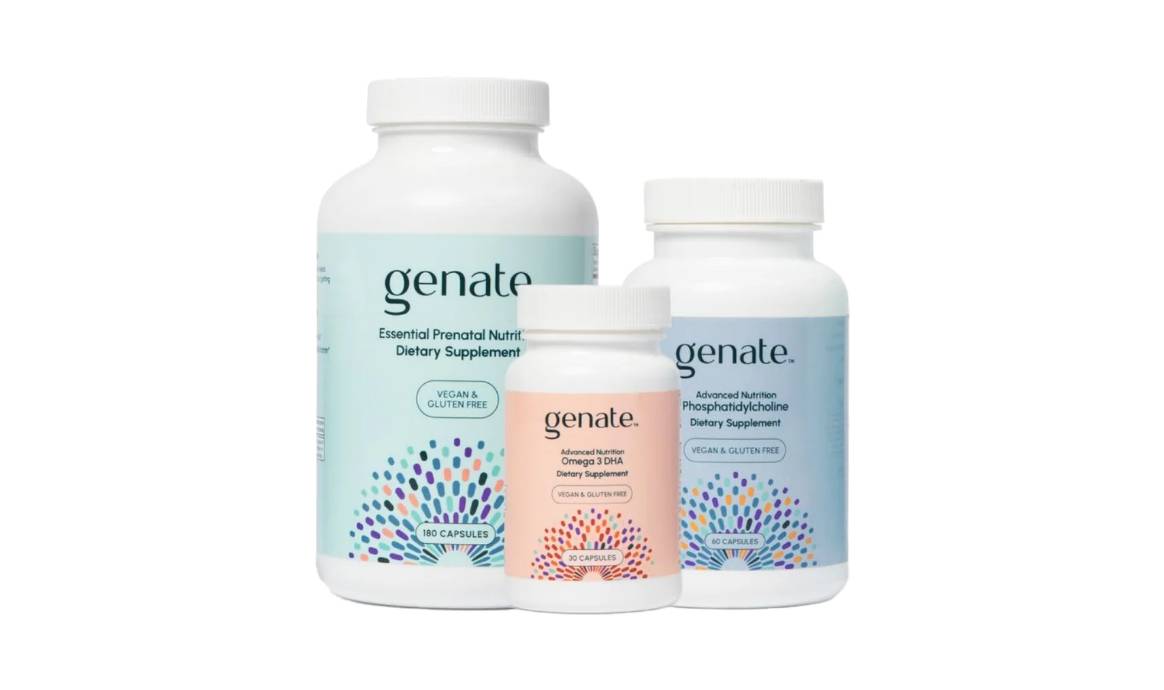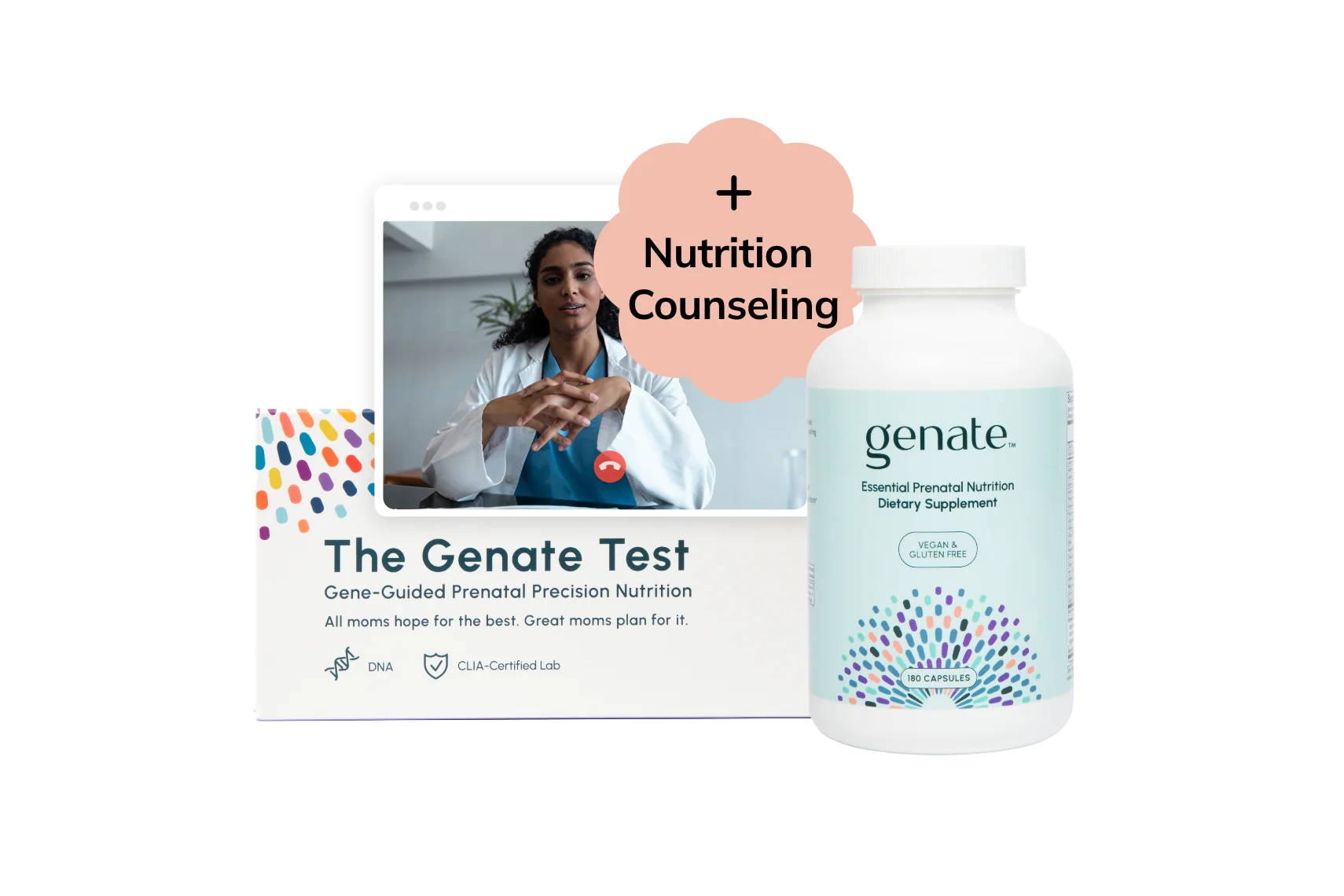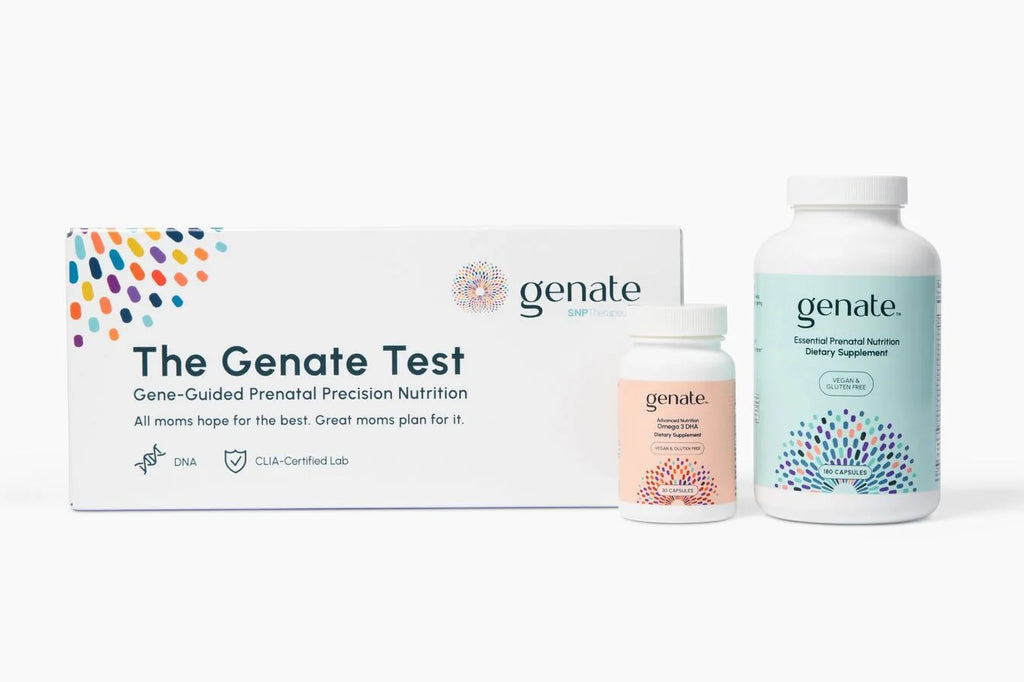Good nutrition is essential for every stage of your baby’s growth and development. But the efficiency with which your body metabolizes nutrients is partly determined by your genes, and common genetic variants can affect the metabolism of one-carbon nutrients that are critical for the development of your child’s brain and spinal cord. Genate Essential Prenatal Nutrition is a multivitamin formulated from academic research that provides women with a formulation optimized to support their baby’s cognitive development. It includes the one-carbon nutrients choline, betaine, methylfolate, and B vitamins that many women have trouble metabolizing and/or don’t get enough of in their diet.

DIET & NUTRITION
What You Need to Know About Probiotics During Pregnancy
by Cara Everett, MS, RDN, LDN • July 12, 2024 • 6-8 minute read
Can you take probiotics while pregnant? Read this article to find out if probiotics are safe during pregnancy, learn about their health benefits, and discover the best probiotics to take while you’re pregnant.
Key Takeaways
- Taking probiotics during pregnancy is one way to support gut health and immune function for both mom and baby.
- Research is ongoing to discover whether probiotics can prevent or treat conditions like acne, eczema, asthma, and obesity.
- Different probiotic strains have different effects on the body, and a healthcare professional can guide you to the type and dosage that’s best for your needs.
- Taking probiotics while pregnant is considered safe for most people, with the exception of immunocompromised individuals and those with serious infections.
What Are Probiotics?
According to the International Scientific Association for Probiotics and Prebiotics (ISAPP), probiotics are “live microorganisms that, when administered in adequate amounts, confer a health benefit on the host.”[2] Simply put, probiotics are “good” bacteria and yeasts that offer a number of health benefits. They can be added to foods and found in supplement form as capsules, powders, and liquids.
To be classified as a probiotic, products must include one or more specific, measurable microbial strains that:
- Are viable (alive) and able to survive in the body
- Provide a proven health benefit to the person or animal ingesting them
Probiotic Types
These are the seven most common types, or strains, of probiotics added to foods and supplements:[3]
- Lactobacillus
- Bifidobacterium
- Bacillus
- Saccharomyces
- Streptococcus
- Enterococcus
- Escherichia
- Lactobacillus (L. acidophilus, L. rhamnosus, L. casei and L. plantarum)
- Bifidobacterium (B. longum and B. breve)
Health Benefits of Probiotics
The intestine, particularly the large intestine (colon), is home to trillions of microbes that are collectively called the gut microbiome.[6] Most of these microbes are bacteria, and some of them are good for your body while others are not so good.
Probiotics are considered “good” microbes. They promote gut health by:
- Limiting the amount of “bad” bacteria in your intestines
- Aiding in digestion of food and medications
- Supporting bowel regularity
- Maintaining the intestinal barrier to keep germs out of your body
Immune Function
Studies show that probiotics influence immune function by “talking” to immune cells and microbes in the GI tract.[9] Not only do they support a healthy immune response to viruses, bacteria, and other pathogens, but probiotics may also help decrease the risk of autoimmune disorders like type 1 diabetes and lupus by regulating the immune system.
Allergies, Atopic Dermatitis, and Eczema
Research is inconclusive on whether probiotic use by lactating mothers and/or their infants helps reduce the risk of atopic dermatitis.[10] One meta-analysis did show that probiotics are helpful in treating atopic dermatitis in adults.[11]
Experts say that although probiotics have not been found to cure existing eczema, they can reduce the chances of an infant developing the condition.[12] A 2015 meta-analysis (a large review of multiple studies) found that infants exposed to probiotics in pregnancy and early infancy had a lower incidence of eczema, although there was no effect on the risk of asthma, wheezing, or allergic rhinitis.[13]
Hypercholesterolemia
Probiotic use in adults has been linked to lower total and LDL cholesterol in some studies. Research is still ongoing in this area, and current indications are that multiple strains must be used over weeks or months to produce a beneficial effect.[3]
Are Probiotics Safe During Pregnancy?
Probiotics have a wide range of health benefits, but are they safe for pregnant women? Let’s see what the research shows.
A wide range of studies indicates that probiotics are indeed safe in pregnancy. When used by healthy people, they aren’t absorbed into the blood or transferred into breast milk. Multiple studies have shown that there is no increased risk of adverse events for mother or baby when women take probiotics during pregnancy.[14]
Probiotics and Pregnancy Outcomes
Research is inconclusive on whether probiotics influence pregnancy outcomes. For example, a 2018 meta-analysis of 21 clinical studies found that the use of probiotics in pregnancy neither raised or lowered the risk of preterm birth, birth weight, gestational diabetes, or preterm premature rupture of membranes (PPROM). The studies in this meta-analysis used Lactobacillus, Bifidobacterium, and/or Streptococcus.[16] The only significant finding was that of blood sugar control, but other research results have been inconsistent on whether probiotics affect blood sugar or the risk of gestational diabetes in pregnant women.[17]
Another meta-analysis of 25 studies conducted in 2021 found similar results: probiotic use during pregnancy did not influence perinatal outcomes (those occurring before, during, and after pregnancy) either positively or negatively.[18] Research is also inconclusive on whether probiotic use in pregnancy affects maternal weight gain, obesity, or the risk of preeclampsia.[17]
Impacts on Infant Health
Probiotic use by mothers during pregnancy and breastfeeding can have beneficial effects on their babies. As mentioned above, probiotics may help reduce the risk of developing eczema early in life. They have also been shown to lower the severity of necrotizing enterocolitis (NEC) and sepsis in preterm infants.[19]
However, the use of probiotics in preterm infants is controversial because there have been reports of fatal illness in low birth weight, preterm infants linked to probiotic administration.[15] Talk to your doctor or other healthcare provider before using probiotics when breastfeeding or giving your baby a product containing probiotics if they were born preterm.
Do I Need a Probiotic Supplement During Pregnancy?
Should you take a probiotic during pregnancy? Most people can benefit from probiotics both when pregnant and at other life stages. That’s because they have many health benefits and can help prevent gut dysbiosis, which if untreated can lead to contributes to inflammation, lowered immune function, small intestinal bacterial overgrowth (SIBO), constipation and/or diarrhea, and other GI symptoms like gas and bloating.
If you’re experiencing any of these symptoms or have recently taken antibiotics (which can also lead to gut dysbiosis), talk to your healthcare provider about whether a probiotic could be helpful for you.
Who Should Not Use Probiotics
Certain people are at risk of systemic infections from probiotics. Do not use probiotics if you:
- Take an immunosuppressant medication
- Are critically ill
- Have a central venous catheter
- Have a compromised intestinal barrier (common in people with undiagnosed celiac disease or IBD)
Where to Find Probiotics
Probiotics can be found in supplements and added to foods. The Genate Essential Prenatal Multivitamin is one of the only prenatal vitamins on the market to include a probiotic. With two billion CFU of Bacillus coagulans per serving, it’s an easy way to get the probiotics you and your baby need without having to take a separate supplement.
Keep in mind that different probiotic supplements contain various strains and amounts of probiotic microbes. As with all nutritional supplements, probiotics aren’t regulated by the FDA. That makes it especially important to look for products from reputable companies that are manufactured in cGMP facilities and third-party tested for purity and potency.
How to Choose a Probiotic Supplement
When shopping for a probiotic, read labels carefully to learn which strains the product contains and how much it provides. Supplement labels will list the amount of colony-forming units (CFU) per serving. This tells you how much live, active probiotic is in the product. Some labels also give the total weight of microorganisms, but CFU is a better indication of their effectiveness.
Look for probiotics with a minimum of 1 billion CFU per serving. Some products go up to 50 billion or more CFU, but the specific strains included are more important than the number of CFU. As always, be sure to talk with your healthcare provider before starting any new supplement.
Other Ways to Keep Your Gut Healthy in Pregnancy
In addition to ingesting foods and supplements containing probiotics, you can take other measures to keep your gut healthy throughout your pregnancy and postpartum period.
Get Moving
Being physically active every day is important for a number of reasons in pregnancy, including gut health. Walking, swimming, bicycling, yoga, and stretching are all low-impact exercises you can do to help prevent constipation during pregnancy and keep your GI tract working as it should.
Aim for at least 30 minutes of low-impact physical activity every day during pregnancy.
Stay Hydrated
In addition to physical activity, adequate water intake is important to combat constipation and promote a healthy gut.[20] It supplies the fluid your colon needs to absorb when producing stool, creating soft bowel movements that are easy to pass. And don’t wait until you feel thirsty to grab your water bottle: studies show that by the time people are thirsty, they may already be dehydrated.
Try to drink at least 8 ounces of water per hour for a goal of 64-96 ounces of water per day.
Keep in mind that caffeine and sugar are dehydrating, so it’s best to choose water, decaf coffee or tea, and other drinks that aren’t sweetened or caffeinated.
Eat More Fiber
Dietary fiber offers the following benefits for pregnant women:[21]
- Encourages a diverse gut microbiome for GI health
- Supports a healthy pregnancy weight gain
- May reduce the risk of preeclampsia (high blood pressure in pregnancy) and gestational diabetes
Choose Gut-Friendly Foods
To support a healthy GI tract, it helps to know what to look for when grocery shopping and eating out. Not every food is a friend to your gut. Highly-processed foods and those with more than 4 grams of sugar per serving (i.e. sodas, other sweetened drinks, and many pre-packaged foods) may taste good, but they do your body more harm than good.
What foods should you look for instead? Foods with live and active cultures like yogurt include a variety of good bacteria that your gut needs to stay healthy. Fermented foods also naturally contain probiotics, though in amounts lower than what you’d find in a supplement. And foods like fruits, veggies, beans, and oats are a great source of prebiotics, which you can think of as “food” for probiotics. In other words, prebiotics are what the probiotic bacteria eat to grow and thrive. Check out our list below of gut-friendly foods.
- Fruits (fresh or frozen without added sugar)
- Vegetables (fresh or frozen)
- Yogurt
- Apple cider vinegar*
- Kefir*
- Kombucha*
- Miso*
- Pickles* (refrigerated varieties)
- Sauerkraut*
You may have heard that sourdough bread is a good source of probiotics. That’s actually a myth: The heat used to bake sourdough bread kills the bacteria that are formed during fermentation, rendering them ineffective as probiotics. The same is true for pickles that are heat-processed. Probiotics must be alive to stay active in the gut and provide health benefits, so these foods also don’t meet the definition of a probiotic.
Bottom Line
Probiotics can be a safe and useful addition to your prenatal diet and supplement regimen. Not only can a quality probiotic supplement and a diet high in probiotic-containing foods support your gut health and immune system, they may also lower your baby’s risk of health problems early in life. Research is ongoing to determine whether probiotics influence pregnancy outcomes, but their general health benefits are well-established.
Check with a healthcare professional if you’re considering adding a probiotic to your nutrition plan, and learn more about the Genate Essential Prenatal Multivitamin if you’re looking for an all-in-one solution with the vitamins, minerals, and probiotics you and your baby need to thrive.
This article is not intended as medical advice to treat or diagnose any health condition but rather as educational health information for the general public. It should not be used as a substitute for individualized medical care from your healthcare provider.
Shop the Article
Save 23% today!
Genate Essential Prenatal Multivitamin + Advanced Omega-3 DHA Package
Bundle to increase savings and provide the foundational nutrients needed for optimal health and development.
From $72 per month
Save 23% today!
Comprehensive Prenatal Support Package
Genate Essential Prenatal Multivitamin + Advanced Omega-3 DHA + Phosphatidylcholine
Our most comprehensive bundle - you’ll receive our Essential Prenatal Multivitamin, Advanced Phosphatidylcholine, and Advanced Omega-3 DHA.
From $110 per month
Save 30% today!
Comprehensive Prenatal Nutrition Bundle
Buy the Genate Test and a nutrition counseling session with a Genate registered dietitian, and receive a 30-day supply of the Genate Essential Prenatal Multivitamin FREE. Purchase includes a 90-day prenatal multivitamin subscription at our best monthly price.
$309

Cara Everett, MS, RDN, LDN
Cara is a registered dietitian nutritionist with a passion for helping people optimize their health with sustainable diet and lifestyle changes. She provides nutrition counseling to clients of all ages, with specialties in nutrigenetics, women's health, and chronic medical conditions.
Cara is also a health writer and editor with over 20 years of experience creating content for print and digital media outlets, nutrition and wellness blogs, and medical white papers. Her work has been featured on websites such as the National Council on Aging, Everyday Health, HelpGuide, MarketWatch, and Verywell. Cara's current writing covers women's nutrition and nutrigenetics in pregnancy and lactation.
As lead dietitian for SNP Therapeutics, Cara shapes content strategy, medically reviews and edits articles, and provides gene-focused medical nutrition therapy for clients. She holds Bachelor of Science and Master of Science degrees in Nutrition from Texas A&M University and completed her dietetic internship at the University of Kentucky Hospital.
References
- National Center for Complementary and Integrative Health. Statistics from the National Health Information Survey. https://www.nccih.nih.gov/health/statistics-from-the-national-health-interview-survey Updated June 13, 2024. Accessed June 13, 2024.
- Hill C, Guarner F, Reid G, Gibson GR, The International Scientific Association for Probiotics and Prebiotics consensus statement on the scope and appropriate use of the term probiotic. Nat Rev Gastroenterol Hepatol 2014;11:506-514. https://doi.org/10.1038/nrgastro.2014.66
- National Institutes of Health. Probiotics. https://ods.od.nih.gov/factsheets/Probiotics-HealthProfessional/ Updated Novermber 3, 2023. Accessed June 11, 2024.
- Cleveland Clinic. Probiotics. https://my.clevelandclinic.org/health/treatments/14598-probiotics Updated October 30, 2023. Accessed June 13, 2024.
- Medline Plus. Bacillus Coagulans. https://medlineplus.gov/druginfo/natural/1185.html Updated November 8, 2023. Accessed June 13, 2024.
- National Institute of Environmental Health Sciences. Microbiome. https://www.niehs.nih.gov/health/topics/science/microbiome Updated March 22, 2024. Accessed June 12, 2024.
- Wilkins T, Sequoia J. Probiotics for gastrointestinal conditions: A summary of the evidence. Am Family Phys. 2017;96(3):170-178 https://www.aafp.org/pubs/afp/issues/2017/0801/p170.html
- Cleveland Clinic. Dysbiosis. https://my.clevelandclinic.org/health/diseases/dysbiosis Updated April 16, 2024. Accessed June 13, 2024.
- Mazziotta C, Tognon M, Martini F, Torreggiani E, Rotondo JC. Probiotics mechanism of action on immune cells and beneficial effects on human health. Cells. 2023;12(1):184. https://doi.org/10.3390/cells12010184
- Anania C, Brindisi G, Martinelli I, Bonucci E, D'Orsi M, Ialongo S, et al. Probiotics function in preventing atopic dermatitis in children. Int J Mol Sci. 2022;23(10):5409. https://doi.org/10.3390/ijms23105409
- Umborowati MA, Damayanti D, Anggraeni S, Endaryanto A, Surono IS, Effendy I, et al. The role of probiotics in the treatment of adult atopic dermatitis: a meta-analysis of randomized controlled trials. J Health Popul Nutr. 2022;41(1):37. https://doi.org/10.1186/s41043-022-00318-6
- National Eczema Society. Diet and eczema. https://eczema.org/information-and-advice/living-with-eczema/diet-and-eczema/ Accessed June 13, 2024.
- G. Zuccotti, F. Meneghin, A. Aceti, G. Barone, M. L. Callegari, A. Di Mauro, et al. Probiotics for prevention of atopic diseases in infants: systematic review and meta-analysis. Eur J Allergy CLin Immunol. 2015;70(11):1356-1371. https://doi.org/10.1111/all.12700
- Elias J, Bozzo P, Einarson A. Are probiotics safe for use during pregnancy and lactation? Can Fam Physician. 2011;57(3):299-301. https://www.ncbi.nlm.nih.gov/pmc/articles/PMC3056676/
- US Food and Drug Administration. Warning regarding use of probiotics in preterm infants. https://www.fda.gov/media/172606/download Published September 29, 2023. Accessed June 13, 2024.
- Jarde A, Lewis-Mikhael AM, Moayyedi P, Stearns JC, Collins SM, Beyene J, et al. Pregnancy outcomes in women taking probiotics or prebiotics: a systematic review and meta-analysis. BMC Preg Childbirth. 2018;18(14). https://doi.org/10.1186/s12884-017-1629-5
- Obuchowska A, Gorczyca K, Standyło A, Obuchowska K, Kimber-Trojnar Ż, Wierzchowska-Opoka M, et al. Effects of probiotic supplementation during pregnancy on the future maternal risk of metabolic syndrome. Int J Mol Sci. 2022;23(15):8253. https://doi.org/10.3390/ijms23158253
- Pérez-Castillo ÍM, Fernández-Castillo R, Lasserrot-Cuadrado A, Gallo-Vallejo JL, Rojas-Carvajal AM, Aguilar-Cordero MJ. Reporting of perinatal outcomes in probiotic randomized controlled trials. A systematic review and meta-analysis. Nutrients. 2021; 17(13):256. https://doi.org/10.3390/nu13010256
- National Center for Complementary and Integrative Health. Probiotics: What You Need to Know. https://www.nccih.nih.gov/health/probiotics-what-you-need-to-know Updated August 2019. Accessed June 13, 2024.
- The American College of Obstetricians and Gynecologists. How Much Water Should I Drink During Pregnancy? https://www.acog.org/womens-health/experts-and-stories/ask-acog/how-much-water-should-i-drink-during-pregnancy Published October 2020. Accessed June 12, 2024.
- Pretorius RA, Palmer DJ. High-fiber diet during pregnancy characterized by more fruit and vegetable consumption. Nutrients. 2020;13(1):35. https://doi.org/10.3390/nu13010035
Take the Genate Quiz
Take our Nutrition Quiz to learn more about your nutrition journey.
Read Our Latest Articles
Frequently Asked Questions
What are the benefits of my baby getting the proper nutrients?
What are one-carbon nutrients and fatty acids, and why are they important?
One-carbon nutrients and fatty acids are critical for brain and spinal cord development during pregnancy and through the first two years of life. Although all nutrients are important, the one-carbon nutrients choline, folate, betaine, and B vitamins, along with the omega-3 fat DHA, provide the building blocks for proper growth of your developing baby's brain. Research at Cornell and Harvard universities has shown cognitive benefits for children born to mothers who received increased levels of one-carbon nutrients during pregnancy, demonstrating that optimal nutrition during pregnancy can have lasting effects for your baby.
If I buy Genate nutrition supplements, do I still need to take the test?
Genetic testing is a personal choice, and only you can decide what’s best for you and your baby. But the Genate Test is a powerful tool for optimizing your nutrition status, as it identifies genetically-caused metabolic inefficiencies that may influence your body’ ability to make and use the nutrients critical for your baby’s cognitive development. If you have SNPs in any of the nutrient pathways tested, your Genate Report will provide personalized recommendations for optimizing your nutrition. Our registered dietitians can show you how to fill in the gaps with foods and supplementation, if needed, to make sure you’re getting the nutrition you and your baby need.








